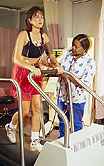Findings in coronary artery bypass graft patients entering cardiac rehab within two weeks of discharge
THURSDAY, Feb. 5, 2015 (HealthDay News) — Early enrollment in cardiac rehabilitation does not increase major adverse event rates among patients who recently underwent open heart surgery, according to a study published in the Feb. 15 issue of The American Journal of Cardiology.
Quinn R. Pack, M.D., from the Mayo Clinic in Rochester, Minn., and colleagues compared clinical adverse events between early (less than two weeks after hospital discharge) and late attendees of cardiac rehabilitation among 112 patients undergoing recent coronary artery bypass graft (CABG) surgery, 69 patients undergoing heart valve surgery (HVS), and 59 patients with myocardial infarction (MI).
The researchers found that median time from hospital discharge to cardiac rehabilitation enrollment was 10.5 days in the CABG group, 12 days for HVS, and nine days for MI. Rates of major events were similar between early and late enrollees (17 versus 17 percent; P = 0.98) and by diagnosis (15, 16, and 22 percent, respectively; P = 0.5). Rates of sternal instability and wound infection were similar. Adverse event rates related to cardiac rehabilitation trended toward increase in surgical and early enrollees. However, only three of 44 events were exercise-related, and none resulted in permanent harm. Most events (93 percent) were managed in cardiac rehabilitation without need for emergency services.
“It appears that a policy of encouraging early enrollment into cardiac rehabilitation in patients with a recent open heart surgery seems unlikely to harm patients when careful individualized assessment and exercise prescription take place within the bounds of an established cardiac rehabilitation program,” the authors write.
Copyright © 2015 HealthDay. All rights reserved.








